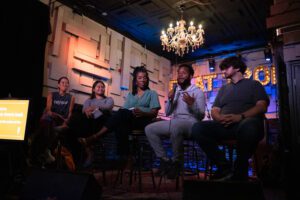Check out the full NC Local newsletter from August 24 for more from the Workshop, including industry news, job postings and shout-outs to journalists statewide. Sign up to get NC Local in your inbox every Wednesday.
By Shannan Bowen, NC Local News Workshop Executive Director
You can learn about communities and their histories, but you don’t truly understand a community until you learn about its people.
This was a wise message shared with me by Lily Wright, who was recently hired to help the Workshop with a community listening event on the Qualla Boundary, home to the Eastern Band of the Cherokee Indians.

Lily, who is Cherokee and works at the Museum of the Cherokee Indian, helped the Workshop convene people from her community for discussions about local issues, perceptions of news coverage and access to news and information. Working alongside Brenda Murphree, the Workshop’s Western NC Research and Community Listening Fellow, Lily arranged and led a series of interviews and focus groups with EBCI members during a humid week in July. These discussions are part of our broader Western NC community listening project that focuses on the 18 westernmost counties of our state, prioritizing listening to communities of color, people in rural areas and people who are impacted by lack of high-speed broadband and other accessibility issues. We’re hoping to learn more about the news and information needs, habits and challenges in Western NC so that the Workshop can help local news organizations understand and address those unmet community needs.
I sat down with Lily after our Qualla Boundary event to talk about her experience interviewing her community members, insights that were shared, and what journalists should know about listening to communities of color. Topics that surfaced in the community listening discussions included representation of Indigenous people in news; where people turn first for news and information; and local and tribal issues that mattered to them.
Many people mentioned the tribal-owned Cherokee One Feather as their main source of local information. And many people interviewed were also quick to point out that they didn’t think other news sources beyond the Boundary reflected or represented them positively.
“The ‘news’ covers the region—but not us,” Lily said as we summed up the takeaways and insights from the interviews.
The largest contiguous part of the Qualla Boundary lies across Swain and Jackson counties, but Lily said many people feel like they aren’t part of one of the counties, unless it’s an election season and candidates visit the Boundary to campaign.
“We do feel alienated a lot,” she said. “Speaking as a (member of) a federally recognized tribe, we constantly do feel like we are in a bit of a glass box. Feeling like we’re not being stared at or looked at is important.”

I asked Lily to share some tips for non-Indigenous journalists who want to learn more from Indigenous communities and other communities of color. She started by recommending researching the communities before diving in and not being too structured in interviews. I could see that this approach worked well for our own listening event on the Qualla Boundary. Brenda, our fellow, researched the area and local Indigenous issues and also spent time asking Lily questions about the community. We also let conversations flow unprompted during focus groups as people became more and more comfortable opening up and sharing their views.
Here are some other tips and advice from Lily:
- Avoid upfront, direct questions about race that make people feel like they’re being put on the spot. For example, instead of asking someone, “What’s it like being part of the Eastern Band of Cherokee Indians,” Lily suggests reframing the question to, “What’s it like to be part of this community?”
- Find the “heart and soul of the community” and learn about the meetings that take place, the community buildings, and other places of gathering.
- Go to actual events and learn about the culture and meet people face-to-face, but Lily recommends enjoying and observing the event first—and then organize your own meetings later.
- Find people who are part of the community to partner with or learn from. Brenda, for example, asked Lily the “dos and don’ts” of interacting with community members before they started interviews.
- Be aware of generational trauma and past trauma. Sometimes people are hesitant to participate in something led by people outside of their communities or who do not share their identities—and it’s important to be aware of the reasons why, Lily said.
- Learn about a community’s pop culture, too. (For example, Lily personally recommends people watch Reservation Dogs or Smoke Signals to learn more about popular references in their community and culture.)
Listening to communities is only the start. News organizations who want to serve specific communities with news and information need to work on content strategies, engagement plans, product development, and—most importantly—building trust to ensure they’re meeting the unmet needs expressed during listening sessions. To start, Lily hopes that more news organizations in Western NC and beyond will start covering more news about their community—their festivals, their pageants, their culture. “No one comes and covers our annual festival that goes on,” she said as an example. “Please, do more coverage on Indigenous people that is not negative.”
Contact me to learn more about our ongoing community listening work, or to seek our help with your own. The Workshop also can help you address the needs of your community by helping you find resources and by providing advice and coaching for your strategies and tactics.



